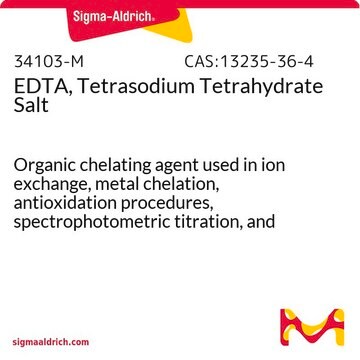E5391
Ethylenediaminetetraacetic acid tetrasodium salt hydrate
≥99.0%
Synonym(s):
EDTA tetrasodium salt, Edathamil, Tetrasodium ethylenediaminetetraacetate hydrate
About This Item
Recommended Products
biological source
synthetic (organic)
Quality Level
Assay
≥99.0%
form
powder
technique(s)
ligand binding assay: suitable
impurities
Insoluble matter, passes filter test
pH
11.0-12.0 (0.1 M in H2O)
solubility
H2O: 0.1 M, clear, colorless
anion traces
chloride (Cl-): ≤0.05%
sulfate (SO42-): ≤0.01%
cation traces
Al: ≤0.001%
As: ≤0.0001%
Ba: ≤0.0005%
Bi: ≤0.0005%
Ca: <0.001%
Cd: ≤0.0005%
Co: ≤0.0005%
Cr: ≤0.0005%
Cu: ≤0.0005%
Fe: ≤0.0005%
Li: ≤0.0005%
Mg: ≤0.0005%
Mn: ≤0.0005%
Mo: ≤0.0005%
Ni: ≤0.0005%
Pb: ≤0.0005%
Sr: ≤0.0005%
Zn: ≤0.0005%
absorption
≤0.06 at 280 in H2O at 0.1 M
≤1.5 at 260 in H2O at 0.1 M
application(s)
sample preparation
storage temp.
room temp
SMILES string
O.[Na+].[Na+].[Na+].[Na+].[O-]C(=O)CN(CCN(CC([O-])=O)CC([O-])=O)CC([O-])=O
InChI
1S/C10H16N2O8.4Na.H2O/c13-7(14)3-11(4-8(15)16)1-2-12(5-9(17)18)6-10(19)20;;;;;/h1-6H2,(H,13,14)(H,15,16)(H,17,18)(H,19,20);;;;;1H2/q;4*+1;/p-4
InChI key
GXFFSKMBMYHTAE-UHFFFAOYSA-J
Looking for similar products? Visit Product Comparison Guide
Application
Preparation Note
Signal Word
Danger
Hazard Statements
Precautionary Statements
Hazard Classifications
Acute Tox. 4 Inhalation - Acute Tox. 4 Oral - Eye Dam. 1 - STOT RE 2
Target Organs
Respiratory Tract
Storage Class Code
11 - Combustible Solids
WGK
WGK 2
Flash Point(F)
Not applicable
Flash Point(C)
Not applicable
Personal Protective Equipment
Certificates of Analysis (COA)
Search for Certificates of Analysis (COA) by entering the products Lot/Batch Number. Lot and Batch Numbers can be found on a product’s label following the words ‘Lot’ or ‘Batch’.
Already Own This Product?
Find documentation for the products that you have recently purchased in the Document Library.
Customers Also Viewed
Our team of scientists has experience in all areas of research including Life Science, Material Science, Chemical Synthesis, Chromatography, Analytical and many others.
Contact Technical Service












